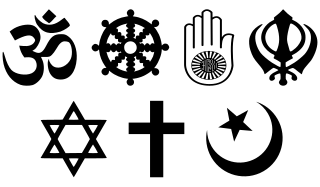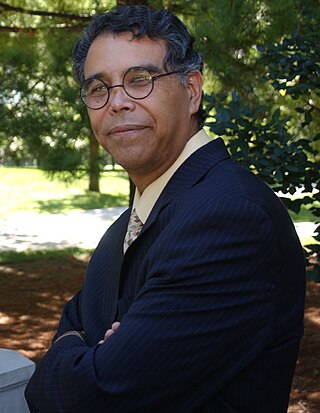Hinduism is an Indian religion or dharma, a religious and universal order by which its followers abide. The word Hindu is an exonym, and while Hinduism has been called the oldest religion in the world, it has also been described as sanātana dharma, a modern usage, based on the belief that its origins lie beyond human history, as revealed in the Hindu texts. Another endonym for Hinduism is Vaidika dharma.

The history of religion refers to the written record of human religious feelings, thoughts, and ideas. This period of religious history begins with the invention of writing about 5,200 years ago. The prehistory of religion involves the study of religious beliefs that existed prior to the advent of written records. One can also study comparative religious chronology through a timeline of religion. Writing played a major role in standardizing religious texts regardless of time or location, and making easier the memorization of prayers and divine rules.
Monotheism is the belief that one god is the only deity. A distinction may be made between exclusive monotheism, in which the one God is a singular existence, and both inclusive and pluriform monotheism, in which multiple gods or godly forms are recognized, but each are postulated as extensions of the same God.

Modern paganism, also known as contemporary paganism and neopaganism, is a type of religion or family of religions influenced by the various historical pre-Christian beliefs of pre-modern peoples in Europe and adjacent areas of North Africa and the Near East. Although they share similarities, contemporary pagan movements are diverse and as a result, they do not share a single set of beliefs, practices, or texts. Scholars of religion often characterise these traditions as new religious movements. Some academics who study the phenomenon treat it as a movement that is divided into different religions while others characterize it as a single religion of which different pagan faiths are denominations.
A nation is a large type of social organization where a collective identity, a national identity, has emerged from a combination of shared features across a given population, such as language, history, ethnicity, culture, territory or society. Some nations are constructed around ethnicity while others are bound by political constitutions.

A national myth is an inspiring narrative or anecdote about a nation's past. Such myths often serve as important national symbols and affirm a set of national values. A national myth may take the form of a national epic, or it may be incorporated into a civil religion. A group of related myths about a nation may be referred to as the national mythos, from μῦθος, Greek for "myth".
Eastern philosophy or Asian philosophy includes the various philosophies that originated in East and South Asia, including Chinese philosophy, Japanese philosophy, Korean philosophy, and Vietnamese philosophy; which are dominant in East Asia, and Indian philosophy, which are dominant in South Asia, Southeast Asia, Tibet, and Mongolia.

Saṃsāra is a Pali and Sanskrit word that means "wandering" as well as "world," wherein the term connotes "cyclic change" or, less formally, "running around in circles." Saṃsāra is referred to with terms or phrases such as transmigration/reincarnation, karmic cycle, or Punarjanman, and "cycle of aimless drifting, wandering or mundane existence". When related to the theory of karma it is the cycle of death and rebirth.
Moksha, also called vimoksha, vimukti, and mukti, is a term in Hinduism, Buddhism, Jainism and Sikhism for various forms of emancipation, liberation, nirvana, or release. In its soteriological and eschatological senses, it refers to freedom from saṃsāra, the cycle of death and rebirth. In its epistemological and psychological senses, moksha is freedom from ignorance: self-realization, self-actualization and self-knowledge.

Leo Strauss was a 20th century German-American scholar of political philosophy. Born in Germany to Jewish parents, Strauss later emigrated from Germany to the United States. He spent much of his career as a professor of political science at the University of Chicago, where he taught several generations of students and published fifteen books.
In most contexts, the concept of good denotes the conduct that should be preferred when posed with a choice between possible actions. Good is generally considered to be the opposite of evil and is of ethics, morality, philosophy, and religion. The specific meaning and etymology of the term and its associated translations among ancient and contemporary languages show substantial variation in its inflection and meaning, depending on circumstances of place and history, or of philosophical or religious context.

Joseph Agassi was an Israeli academic with contributions in logic, scientific method, and philosophy. He studied under Karl Popper and taught at the London School of Economics.
Steven Mitchell Nadler is an American academic and philosopher specializing in 17th-century philosophy. He is Vilas Research Professor and the William H. Hay II Professor of Philosophy, and was Max and Frieda Weinstein-Bascom Professor of Jewish Studies at the University of Wisconsin–Madison. He is also director of their Institute for Research in the Humanities.

Polish nationalism is a nationalism which asserted that the Polish people were a nation and which affirmed the cultural unity of Poles. British historian of Poland Norman Davies defines nationalism as "a doctrine ... to create a nation by arousing people's awareness of their nationality, and to mobilize their feelings into a vehicle for political action."

Hector Avalos was a professor of Religious Studies at Iowa State University, cultural anthropologist, and the author of several books on religion. Avalos was an atheist and advocate of secular humanist ethics.
James L. Crenshaw is the Robert L. Flowers Professor of the Old Testament at Duke University Divinity School. He is one of the world’s leading scholars in Old Testament Wisdom literature. He proposes that much of Proverbs was brought together at a time well after Solomon. He has been described as "a highly respected scholar" and an "excellent teacher".

Neo-Vedanta, also called Hindu modernism, neo-Hinduism, Global Hinduism and Hindu Universalism, are terms to characterize interpretations of Hinduism that developed in the 19th century. The term "Neo-Vedanta" was coined by German Indologist Paul Hacker, in a pejorative way, to distinguish modern developments from "traditional" Advaita Vedanta.
Modern scientific research on the history of Zen discerns three main narratives concerning Zen, its history and its teachings: Traditional Zen Narrative (TZN), Buddhist Modernism (BM), Historical and Cultural Criticism (HCC). An external narrative is Nondualism, which claims Zen to be a token of a universal nondualist essence of religions.
David Lyle Jeffrey is a Canadian-American scholar of literature and religion, currently a Distinguished Senior Fellow at the Baylor Institute for Studies in Religion. He was elected a Fellow of the Royal Society of Canada (1996-). In 2003 he was given the Lifetime Achievement Award of the Conference of Christianity and Literature.
Several scholars of nationalism support the existence of nationalism in the Middle Ages. This school of thought differs from modernism, the predominant school of thought on nationalism, which suggests that nationalism developed largely after the late 18th century and the French Revolution. Theories on the existence of nationalism in the Middle Ages may belong to the general paradigms of ethnosymbolism and primordialism (perennialism).







